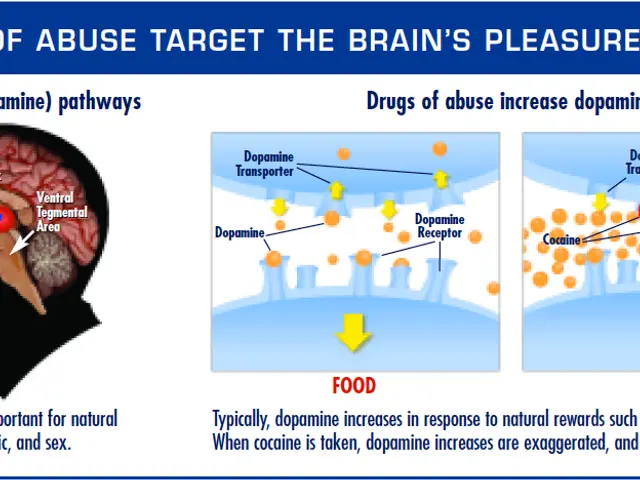Alzheimer's Prevention Oberator: Choline - Shattering Barriers in Dementia Defense
Boosting Brain Power with Choline
Choline, a nutrient similar to vitamins, is crucial for healthy brain development and function. Without sufficient choline intake (400-500mg daily), communication between neurons can falter, leading to issues with memory, mood regulation, and even voluntary and involuntary bodily processes. This breakdown can set the stage for neurodegenerative diseases such as Parkinson's and Alzheimer's.
Researchers have uncovered the reason behind this phenomenon and choline's potential to break new ground in treating neurodegenerative diseases.
Mastering the Blood-Brain Barrier
The blood-brain barrier (BBB) is a protective layer of specialized cells that keeps harmful substances out of the brain. Still, it allows essential nutrients to pass through with the help of facilitator cells known as transporters.
Recent findings reveal that choline is transported across the BBB by hiding within a protein molecule known as FLVCR2. This discovery could pave the way for the development of drugs that mimic choline, allowing them to cross the BBB and reach the brain, potentially revolutionizing neurological disease treatment.
A Shield Against Alzheimer's
While the development of such drugs may still be a ways off, you can lower your risk of Alzheimer's by ensuring you get enough choline in your diet. The neuroprotective benefits of choline stretch beyond your own health; they could also safeguard your grandchildren if you share your knowledge with pregnant relatives.
Choline's significance revolves around its role as a precursor to the neurotransmitter acetylcholine (ACh). A deficiency in ACh can lead to difficulties with word recall, memory problems, and learning challenges. Certain medications can interfere with ACh, including those used for colds, bladder leaks, and Parkinson's.
Experiments with mice, whose nervous systems closely mirror ours, showed that choline:
- Decreased levels of homocysteine, a neurotoxic amino acid linked to an increased risk of Alzheimer's.
- Reduced the number of overactive microglia in the brain, lowering inflammation and protecting brain cells.
Fueling Your Brain's Needs
Although your liver generates some choline, it may not produce enough to meet your body's demands. You need to obtain choline from your diet as well. Sadly, most people aren't meeting the recommended daily intake, especially vegetarians and vegans since animal products are rich choline sources.
The US Institute of Medicine suggests women need 425mg daily, while men require 550mg. Pregnant and breastfeeding women should consume a bit more. Luckily, numerous plant-based foods can provide choline: soymilk, tofu, edamame, peanut butter, pistachios, almonds, quinoa, oats, pinto beans, green peas, artichokes, asparagus, Brussels sprouts, cauliflower, broccoli, potatoes, collard greens, oranges, and more.
Ensure you incorporate a variety of these choline-rich foods at each meal to safeguard your cognitive health!
Editor's note: Tiredness may be a sign of hormonal imbalances, which can increase your risk of age-related diseases. Reset your body's master hormone by *Clicking here to explore "The Insulin Factor: How to Repair Your Body's Master Controller and Conquer Chronic Disease!*"
Sources:
- Choline and Alzheimer's disease: Could diet help reduce risk? - Medical News Today
- The Role of Choline in the Prevention of Alzheimer's Disease - Frontiers in Aging Neuroscience
- Understanding Choline Deficiency and the Importance of Adequate Choline Intake - Nutrients
- Choline: An Essential Nutrient for Healthy Brain Development - Neurobiology of Disease
- Choline Metabolism and Transport in the Brain: Biochemistry and Clinical Implications - The American Journal of Clinical Nutrition
- The Blood-Brain Barrier and Drug Delivery: Potential Strategies for Overcoming the Challenges - Expert Opinion on Drug Delivery
- The discovery of choline's mode of transportation across the blood-brain barrier (BBB) through the protein molecule FLVCR2 could lead to the development of drugs that mimic choline, potentially revolutionizing neurological disease treatment.
- Ensuring a sufficient choline intake of 400-500mg daily can help maintain healthy brain development and function, preventing issues with memory, mood regulation, and bodily processes, thereby reducing the risk of neurodegenerative diseases such as Parkinson's and Alzheimer's.
- Pregnant relatives can share the neuroprotective benefits of choline with their offspring, safeguarding future generations' brain health.
- Certain medications can interfere with the neurotransmitter acetylcholine (ACh), including those used for colds, bladder leaks, and Parkinson's, increasing the risk of Alzheimer's disease due to a deficiency in ACh.
- A diet rich in choline-containing plant-based foods such as soymilk, tofu, peanut butter, pistachios, almonds, quinoa, oats, pinto beans, green peas, artichokes, asparagus, Brussels sprouts, cauliflower, broccoli, potatoes, collard greens, oranges, and more can help meet the daily recommended intake of choline and maintain healthy brain function.







